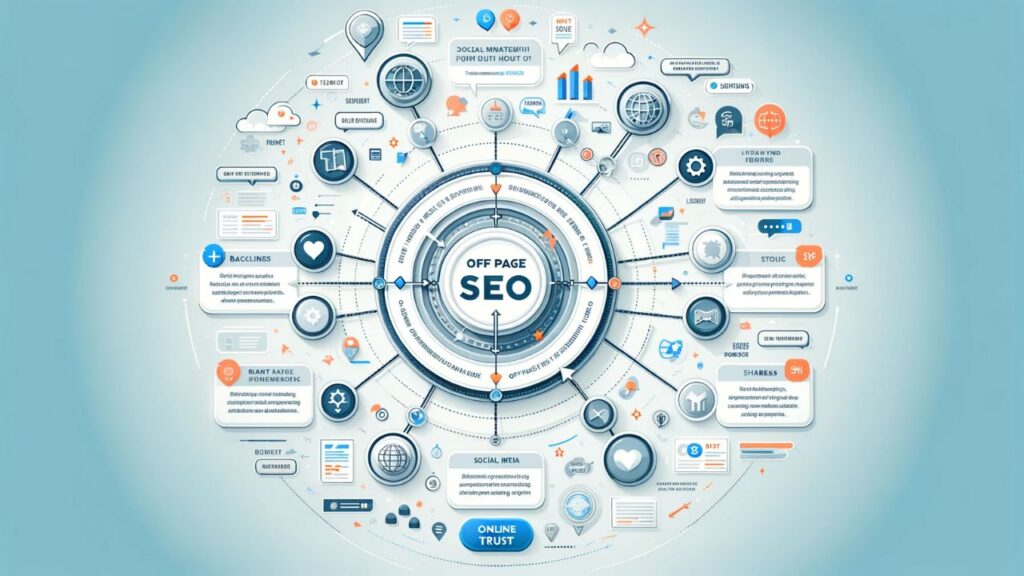Having a robust online presence is non-negotiable. While many businesses focus heavily on on-page SEO strategies such as keyword optimization, metadata, and internal linking, off page SEO often takes a backseat. However, off page SEO plays a critical role in driving organic traffic, improving search engine rankings, and establishing online trust.
In this blog, we’ll explore the fundamentals of off page SEO, why it matters, and how you can leverage it to build authority and trust for your website.
Table of Contents
What is Off Page SEO?
Off page SEO refers to all activities undertaken outside of your website to improve its visibility and ranking on search engine results pages (SERPs). Unlike on page SEO, which focuses on optimizing elements within your website, off page SEO deals with external factors that signal to search engines that your site is trustworthy, relevant, and authoritative.
At its core, off page SEO is about creating relationships and building trust with users, search engines, and other websites. It encompasses a variety of strategies and techniques aimed at improving how other websites perceive your content and brand.
Why is Off Page SEO Important?
Search engines like Google evaluate a website’s trustworthiness and authority based on signals from external sources. While high-quality content and an optimized website structure are essential, they alone won’t guarantee top rankings. Search engines consider off page factors as indicators of a site’s credibility, which directly impacts rankings.
Key Benefits of Off Page SEO:
- Improved Rankings: Off page SEO helps you achieve higher positions in SERPs by demonstrating your site’s value and authority to search engines.
- Enhanced Credibility: Backlinks, brand mentions, and positive user signals indicate that your site is trustworthy and worth visiting.
- Increased Organic Traffic: High search rankings translate to greater visibility, leading to more clicks and traffic from search engines.
- Brand Awareness: Off page activities can amplify your brand’s reach and recognition across various platforms.
- Stronger Domain Authority (DA): Effective off page SEO increases your website’s DA, a metric that correlates with better rankings.
Essential Components of Off Page SEO

Off page SEO involves several strategies that work together to boost your site’s performance. Below, we’ll cover the most impactful techniques:
1. Backlink Building
Backlinks, also known as inbound links, are the cornerstone of off page SEO. A backlink is created when one website links to another, essentially endorsing its content. High quality backlinks from reputable websites signal to search engines that your content is valuable and trustworthy.
- Why Backlinks Matter: Google’s algorithm places significant emphasis on backlinks. Websites with a robust backlink profile are more likely to rank higher in search results.
- Quality Over Quantity: Not all backlinks are equal. Links from authoritative, relevant sites hold much more value than a high volume of low-quality links.
Strategies for Earning Quality Backlinks:
- Guest Posting: Publish valuable content on authoritative websites in exchange for a link back to your site.
- Content Promotion: Share your content with influencers, bloggers, and industry leaders to encourage them to link to your site.
- Broken Link Building: Identify broken links on other websites and suggest your content as a replacement.
- Skyscraper Technique: Create content that’s better than existing top-performing content and pitch it to websites linking to the source.
2. Social Media Engagement
Social media platforms play an integral role in off page SEO by amplifying your content’s visibility and reach. While social signals (likes, shares, comments) are not direct ranking factors, they contribute to building your brand and driving traffic.
Tips for Social Media Optimization:
- Consistency is Key: Post regularly and engage with your audience across platforms.
- Optimize Your Profiles: Ensure your profiles are complete, with accurate information and links to your website.
- Leverage Visual Content: Share eye-catching images, videos, and infographics to boost engagement.
3. Brand Mentions
Brand mentions occur when your business or website is referenced online, whether or not there’s a backlink involved. Search engines can recognize these mentions and use them as trust signals.
How to Encourage Brand Mentions?
- Build relationships with influencers and journalists who can mention your brand.
- Actively participate in online forums and communities.
- Create shareable, high-quality content that sparks conversations.
4. Online Reviews and Reputation Management
Online reviews are a powerful off page SEO signal. They provide social proof to potential customers and influence how search engines perceive your business.
Best Practices for Managing Reviews:
- Encourage Feedback: Prompt customers to leave reviews on platforms like Google My Business, Yelp, and Trustpilot.
- Respond to Reviews: Engage with positive and negative reviews professionally and constructively.
- Monitor Your Reputation: Use tools like Google Alerts to track mentions of your brand and address any issues promptly.
5. Local SEO and Citations
For businesses targeting local audiences, local SEO is a crucial aspect of off page optimization. Citations, which are mentions of your business name, address, and phone number (NAP) on other websites, help search engines validate your business’s legitimacy.
How to Optimize Local SEO?
- Claim and optimize your Google My Business profile.
- List your business in relevant online directories.
- Ensure NAP information is consistent across all platforms.
6. Influencer Marketing
Partnering with influencers in your industry can amplify your content’s reach and enhance your brand’s credibility. Influencers often have large, engaged audiences that can help drive traffic to your website.
Tips for Successful Influencer Collaboration:
- Choose influencers whose audience aligns with your target market.
- Collaborate on content that provides value to their followers.
- Track the performance of influencer campaigns to measure their effectiveness.
7. Content Syndication
Content syndication involves republishing your content on other platforms to increase its visibility and reach a broader audience. While the republished content may not directly impact rankings, it can drive referral traffic and boost brand awareness.
Popular Platforms for Syndication:
- Medium
- LinkedIn Pulse
- Quora
- Industry-specific blogs and forums
How Search Engines Evaluate Off Page SEO?
Search engines use sophisticated algorithms to evaluate off page SEO factors. Key metrics include:
- Link Quality: The authority, relevance, and diversity of backlinks are critical.
- Anchor Text: The text used in backlinks can provide context about your content to search engines.
- Social Signals: Engagement metrics from social media platforms.
- Domain Authority: The overall strength of your website, based on factors like backlinks and trustworthiness.
Common Off Page SEO Mistakes to Avoid
While off page SEO can significantly impact your rankings, mistakes can undermine your efforts. Avoid these common pitfalls:
- Buying Backlinks: Acquiring backlinks through paid schemes violates search engine guidelines and can result in penalties.
- Ignoring Brand Mentions: Unlinked mentions are a missed opportunity to build authority and relationships.
- Over-Optimization: Excessive use of exact-match anchor text can appear manipulative and harm rankings.
- Neglecting Local SEO: Overlooking local citations and reviews can limit your reach within your target region.
Measuring the Success of Off Page SEO
Tracking the performance of your off page SEO efforts is essential to refine your strategy. Key metrics to monitor include:
- Referral Traffic: Measure traffic from external links and social platforms.
- Domain Authority: Use tools like Moz or Ahrefs to track changes in your site’s DA.
- Backlink Profile: Evaluate the quality and quantity of backlinks regularly.
- Search Rankings: Monitor keyword rankings to assess the impact of your efforts.
The Future of Off Page SEO
As search engine algorithms evolve, off page SEO will continue to adapt. Future trends may include:
- Increased emphasis on E-E-A-T (Expertise, Authoritativeness, Trustworthiness) signals.
- Greater weight placed on user-generated content and authentic brand mentions.
- Continued growth of voice search and its impact on off page factors like local SEO.
- Advancements in AI and machine learning, shaping how search engines interpret off page signals.
Conclusion
Off page SEO is a vital component of a successful digital marketing strategy. By focusing on building high-quality backlinks, engaging with social media audiences, encouraging brand mentions, and managing your online reputation, you can create a strong foundation of trust and authority for your website. While on-page SEO lays the groundwork, off page efforts ensure your site is visible, credible, and competitive in the search engine rankings.
Implementing a comprehensive off page SEO strategy takes time, effort, and consistency, but the rewards—higher rankings, increased traffic, and enhanced online trust—are well worth the investment.



